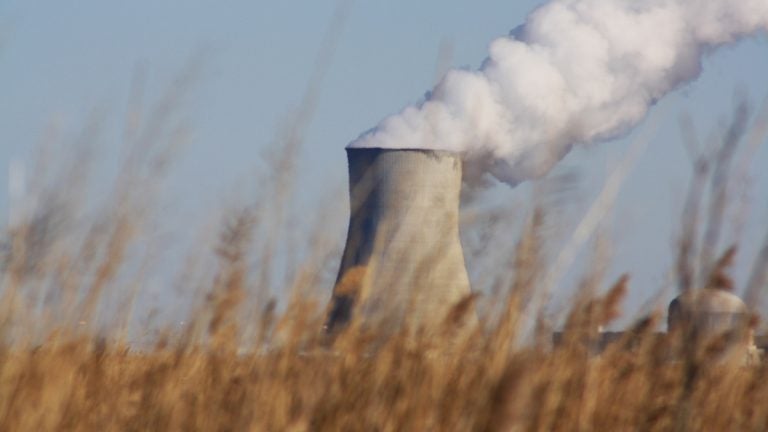PSEG canceling nuclear plant spending due to stalled bailout
New Jersey's largest utility is canceling spending on capital projects at a nuclear plant because a $300M financial bailout has stalled in the Legislature.

Salem Nuclear Power Plant as seen from the Blackbird Creek. (Brian Drouin/WHYY)
New Jersey’s largest utility is canceling spending on capital projects at a nuclear plant because a $300 million taxpayer-funded financial bailout of the state’s nuclear industry has stalled in the Legislature.
Public Service Enterprise Group said in a Securities and Exchange Commission filing dated Wednesday that it will halt the projects at the Salem nuclear plant in southern New Jersey. A spokesman said the spending covered efficiency and reliability maintenance.
PSEG says the decision comes after “recent postponements” of a vote on legislation to provide the financial rescue. The bill, which has undergone several changes and was held during a recent session, includes clean-energy requirements that lawmakers say were sought by Democratic Gov. Phil Murphy.
PSEG filed the document along with Exelon, which is a co-owner of the plant. It said that funding for the projects may be restored if legislation is enacted “that sufficiently values the attributes of nuclear generation and Salem benefits from such legislation.”
“These project cancellations will have an impact on the business community as we would employ vendors to assist us with these types of projects,” said PSEG spokesman Michael Jennings. “And it will impact jobs, because our vendors hire skilled tradespeople – electricians, pipefitters, laborers and others — to complete these types of projects.”
New Jersey generates about 40 percent of its electricity from nuclear power. PSEG says that its plants, including the Salem facility and Hope Creek, are in danger of becoming financially unsustainable within two years. That led PSEG President and CEO Ralph Izzo to ask lawmakers for financial help from ratepayers.
The company has also argued that nuclear power is worth keeping afloat because it generates zero carbon emissions, which appeals to Murphy’s promise to move the state toward an all-clean-energy economy.
The plants also employ roughly 2,000 people, particularly in Senate President Steve Sweeney’s district. Sweeney, who has pushed the legislation, has cited those jobs as a factor. His office said he had no comment on PSEG’s decision to cut capital spending at the Salem plant.
Messages left with Assembly Speaker Craig Coughlin and Murphy’s office were not immediately returned.
Under the proposed legislation, New Jersey’s utility ratepayers would finance the cost of supporting nuclear power. PSEG estimates the cost would be about $30 a year for its average ratepayer. The state attorney who by law represents ratepayers estimates the amount could be closer to $40 a year, but those estimates exclude the cost of additional subsidies for clean energy. Those costs are unclear.
WHYY is your source for fact-based, in-depth journalism and information. As a nonprofit organization, we rely on financial support from readers like you. Please give today.




